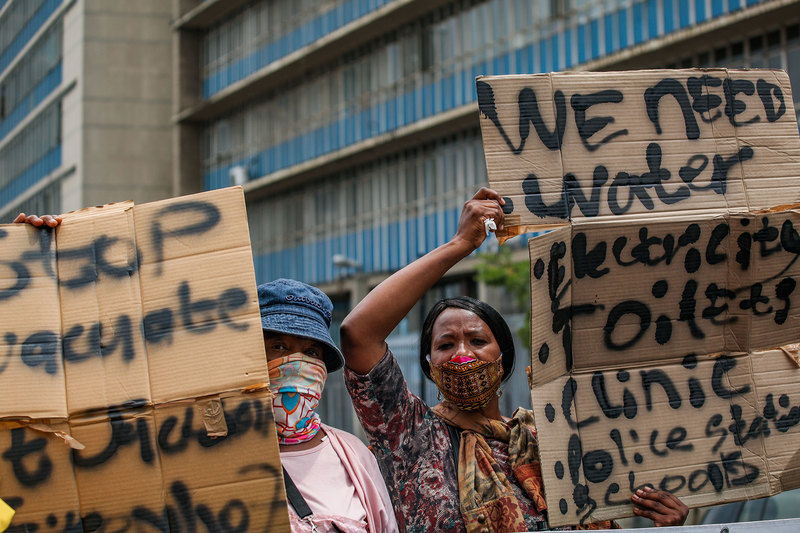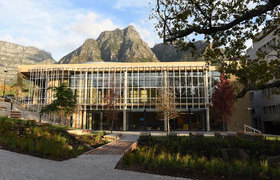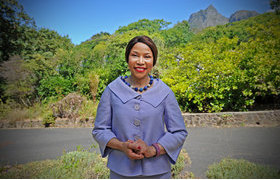Resilience, collaboration, and the future of humankind
14 July 2021 | Story Helen Swingler. Photo Gallo Images/Sharon Seretlo. Read time 9 min.
As COVID‑19 has shown, the world can succeed in shaping resilient societies – but only through global collaboration, said University of Cape Town (UCT) Vice-Chancellor Professor Mamokgethi Phakeng.
“Any challenge today that threatens resilience in any society will have global repercussions – if not immediately, then in the future.”
Professor Phakeng was speaking at a United Nations (UN) High-Level Political Forum (HLPF) 2021 panel discussion, titled “Shaping Resilient Societies: Can one succeed?”. It was hosted by the Swiss Federal Department of Foreign Affairs (FDFA), the Swiss Federal Statistical Office, the University of Zurich and the University of Geneva. Phakeng delivered the summary.
“We cannot discuss the resilience of one part of the world without also taking into account the rest of the world.”
“We cannot discuss the resilience of one part of the world without also taking into account the rest of the world,” Phakeng continued. “COVID‑19 has taught us that local is global. Many of us in the Global South have always known that, but the pandemic has made that much more visible. For instance, the Global North has realised that the only way to halt the development of new COVID‑19 variants is to vaccinate the whole world.”
The high‑level forum included participants from a range of disciplines. The session was opened by Professor Pascale Baeriswyl of the FDFA, who also welcomed South Africa’s permanent ambassador to the UN, Ambassador Mathu Joyini, to the forum. The keynote address was delivered by Professor Peter Messerli of the Wyss Academy for Nature at the University of Bern.
The panellists were Dr Sheila Aggarwal‑Khan, director of the Economy Division of the UN’s Environment Programme; Dr Ola Awad, president of the Palestinian Central Bureau of Statistics; Professor Nikola Biller-Andorno, director of the Institute of Biomedical Ethics at the University of Zurich; Volker Türk, assistant secretary‑general for strategic coordination in the executive office of the secretary‑general at the UN headquarters in New York; Professor Markus Stoffel, of the Institute of Molecular Systems Biology at ETH Zürich; and Professor Giacomo De Giorgi of the Graduate School of Economics at the University of Geneva. Professor Michael Schaepman, president of the University of Zurich, was the moderator.
Shock resistant
The Stockholm Resilience Centre has described resilience as “the capacity of a system to withstand shocks and still continue to function in a desired way. It covers three key features: persistence, adaptability and transformability”.
According to the HLPF 2021 Sustainable Development Report, COVID‑19 has delivered a major global blow to the economic, social and environmental dimensions of sustainable development. Panellists spoke about how to brace for future shocks through transversal, cross‑sectoral and cross‑societal responses.
The pandemic has been a magnifying glass, said Professor Messerli. But there is no vaccine for sustainable development.
“We can’t tick single boxes, or rely on the answers of yesterday; we have to think systemically.”
Resilience also needs a collaborative base, said Phakeng.
“As Professor Biller‑Andorno indicated, we can succeed in shaping resilient societies; but only together. The future of all humankind depends on collaboration – not just to address the pandemic, but to address all [the] problems we have in common.”
Inequality is no building block
Phakeng said that long before the rise of COVID‑19, the world had already been beset by inequality, aggravated by climate change and shortages of basic resources such as water, shelter, food and healthcare.
“People in the Global South also have higher aspirations than simple resilience.”
“These issues are growing in the Global North too. Professor Stoffel argues that the risk of a global pandemic always existed; yet organisations and individuals were caught by surprise. In addition, the lack of preparedness caused negative impacts. And he asks a pointed question: Are we ready for the next shock? What are the risks, and what could the next shock look like? What kind of shock will we be ready for? And how is the current pandemic preparing us for this?”
Phakeng said that the silver lining behind the pandemic is that society has been reminded of the historic and universal problems that still exist.
“COVID‑19 is forcing us to consider what sustainability and resilience mean for human beings. And it is teaching us that temporary shocks can have lasting effects – for example, on the education of our children.”
She said millions of children are losing out on education; a problem that will become starkly apparent in the future.
“People in the Global South also have higher aspirations than simple resilience. In the first place, we don’t have the same resources as the Global North to recover from devastating events, whether they are health‑related or the result of weather events.”
In Africa, the pandemic has caused setbacks in treating infectious diseases such as HIV, TB, malaria and measles. Civil unrest in these situations could cause a new disaster, she added; and in developing countries, women and girls are losing the gains they made in equality before the pandemic struck.
“I agree with Dr De Giorgi that unequal and unfair systems are not resilient, because they are characterised by different opportunities among actors. We need to understand where the deep inequalities originate, and find sustainable solutions through policy, when and where needed.”
“Poor societies have no real platform to bounce back to.”
She said that “the priority for poor societies in the Global South [was never] to just bounce back” to where they were before the catastrophe.
“Poor societies have no real platform to bounce back to. We can only rebuild from the ground up; but we can build with a better understanding of what our societies need [in order] to grow.”
Phakeng said that UCT has had the foresight to develop a proactive approach to disruption.
“We understood long ago that the Fourth Industrial Revolution would disrupt our many business sectors. So we decided that we would disrupt our traditions and habits, and innovate as far as possible. That’s not an easy stance to take when you see yourself as a top‑performing institution on the continent. But the decision served us well when we suddenly had to hold classes remotely last year during hard lockdown.”
Address sustainability
The UN’s Sustainable Development Goals indicate that countries in the Global South are not on a sustainable path to begin with, Phakeng added.
“In many ways, we need to disrupt old patterns so that we can unleash the potential those countries offer to contribute to the growth of all humankind. Just because we are struggling economically doesn’t mean that the Global South can’t contribute a great deal to the global move towards sustainability.”
She noted: “We have resources and talent to take part in this discussion; to collect and analyse data, and use that data – with our contextual understanding of the Global South and its needs and resources – to help develop solutions. In this way, the Global South can contribute to a better understanding of differential impacts and vulnerabilities within the society, country, region [and] continent.”
But neither is the Global North on a sustainable path.
“The United States has just begun addressing issues of environmental sustainability and sustainable justice under President Joe Biden. And the Organisation for Economic Cooperation and Development has facilitated a global agreement to ensure that member countries stop tax evasion by corporates – a move that will allow profits to be shared more fairly.
“And last month, the G7 leaders endorsed an agenda which they say could lead to greater universal prosperity, a faster and fairer pandemic recovery, improved environmental and labour protections, and addressing long‑term inequities in the global trading system. They agreed that collaboration was key to securing global prosperity.”
Phakeng concluded: “South Africa is on a long journey to recover from economic and political social injustice. We know from our own country that resilience in any part of the world, including the Global North, must include a commitment to inclusivity and diversity. This means more voices from the Global South in discussions like this one.”
 This work is licensed under a Creative Commons Attribution-NoDerivatives 4.0 International License.
This work is licensed under a Creative Commons Attribution-NoDerivatives 4.0 International License.
Please view the republishing articles page for more information.










